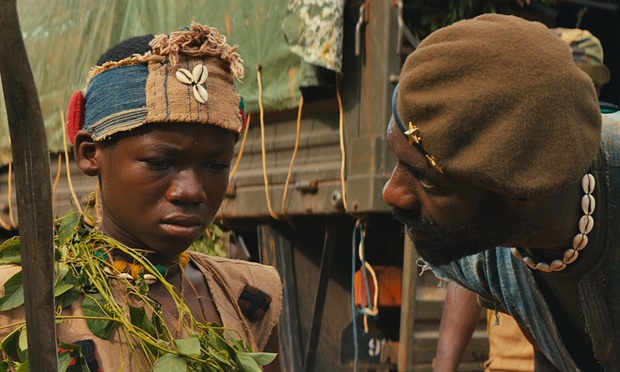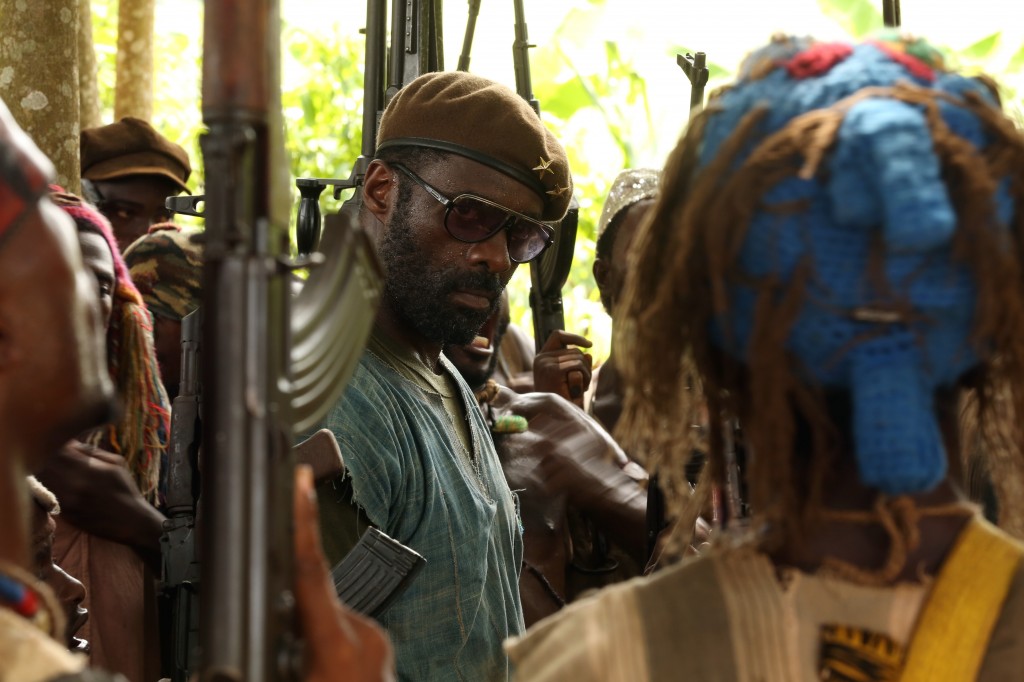At face value, there’s little about Beasts of No Nation, the latest from True Detective helmer Cary Joji Fukunaga, that really feels all that fresh. It exists at the intersection of two very tired cinematic obsessions: the heavy handed delineation of war’s tragic aftereffects, and the curious schadenfreude white filmgoers seem to derive from experiencing black strife from the safe umbrage of the movie screen. Based on the novel by Uzodinma Iweala, Beasts follows a young boy named Agu (newcomer Abraham Attah) and his horrendous tenure as a child soldier under the nameless Commandant (Idris Elba) in a nebulous West African country. Despite being sandwiched between two artistic aims that, more often than not, produce frustrating results, Fukunaga (who also scripted and acted as cinematographer) executes this tale with enviable aplomb, sidestepping the kind of pitfalls that may have felled a lesser filmmaker.
Making a war film in today’s political climate can be such a difficult undertaking because few storytellers can frame a narrative around combat ravaging the human psyche without getting bogged down by the particulars of the conflict itself. A film like American Sniper had some interesting things to say about the inner lives of our troops, but Clint Eastwood’s personal politics and the divisive nature of the Middle East clouded what otherwise might have been a fascinating meditation on what killing for your country does to a person. Similarly, staging such a story around a bygone era, like, say, any film based in WWII, makes it far too easy to nostalgically fret over period details and the physical accuracy of weapons like some masturbatory History Channel-watching Greatest Generation fetishist. By grounding Beasts in an indiscriminate climate of warfare, it transcends the usual polemical concerns to focus on war as something that happens, something that has always happened and, unfortunately, will continue to happen.
The conflict that leads to Agu’s family being killed almost feels biblical in its simplicity and mythic power. His father just wants to help protect the land they live on, but they’re beset on all sides by warring acronymed forces. Other films principally concerned with exploiting African struggles for spoiled, post-art house dinner chatter might begin the film in media res, showing us only a protracted, sepia toned portrait of brown bare feet skittering through mud, tears, and blood and tragedy in unending repetition. Beasts has more than its fair share of human horror, but it smartly takes its time getting there, first giving us time to meet Agu and the vibrancy of life that exists within him. We see him hustle a broken TV to a soldier for food, play around with his friends, and yes, there’s even a few fart jokes. Agu is presented with such verve and frivolity that when his life is taken away from him and he’s thrust into the “care” of The Commandant, we feel exactly what he misses of his old life.
Attah is a minor revelation as Agu, imbuing our protagonist with such verve and wit. You fall in love with him almost instantly, which is a deeply uneasy experience, knowing as we do that the rest of the film’s running time has little pleasant in store for him. He has a screen presence hefty beyond his years. The short sequence of him by himself in the woods trying to find food before he encounters The Commandant could easily have lasted longer, and it’d have been a while before you’d require anything more than Attah’s compelling visage to sate your thirst for drama. Once Idris Elba makes his entrance, though, it’s hard to argue that this isn’t his picture.
Elba has had a number of very good roles in his career, but The Commandant might be his first truly great one. His initial veneer of charisma is intoxicating. He poisons the senses so completely that you’re almost grateful he’s taken Agu into his NDF (Native Defense Force), but after the training montages, the sickening first life Agu takes and the ritualistic admission into the battalion, The Commandant slowly reveals himself to be so much more insidious than originally foreshadowed. The true depths of his exploitation become more apparent as Agu sinks further down the rabbit hole of drugs, death, and degradation, stripping away layer after layer of innocence.
At times, Beasts feels like a twisted fairy tale, a fucked up version of Peter Pan’s Lost Boys only with more assault rifles and less holding onto happy thoughts. Fukunaga paints his frames with striking, eye popping color occasionally suppressed by muted tones. It gives the film’s brilliantly blocked battle scenes an extra-real feeling. In more than one moment, I thought of a Wes Anderson film polluted by the corrupting specter of death, watching these once carefree youths indoctrinated into a life they can never truly escape. Agu’s first battlefield experience under the influence of drugs is a prime example of this, coming off as a heightened, surreal vision of war that is no less disturbing for all its theatrical intensity.
There’s something elemental about the film’s tone that calls to mind Terrence Malick, particularly in the use of voice-over and the way we the viewers are so rapturously ensconced in Agu’s personal POV. Language plays an important role, as Agu’s narration from the novel utilizes a unique English cadence that gives his deceptively simplistic declarations of pain and loss a poetic edge. It’s not quite the idiosyncratic patter of a Days of Heaven, but it more closely resembles the present tense confessional tone of The Thin Red Line, with Agu alternately pleading to God and his mother, the latter once he is given confirmation that the former can’t possibly hear him where he’s gone.
The film’s conclusion couches its final statement on what war does to its combatants in a somewhat hopeful coda, reinforcing that a child soldier is no less traumatized than a legal aged one might be. Movies about adult soldiers sometimes pussyfoot around PTSD with heroic notions of what a man must do, but the circumstances surrounding what Agu’s endured leave little room for such interpretation. Death rests nestled in this boy’s eyes and it may never leave. Beasts is a harrowing experience, but a powerful one. It might read as derivative to a cynic, but there’s something palpable at the film’s core that can’t be denied.
Beasts of No Nation is available to stream now on Netflix and is playing in limited release theaters.



